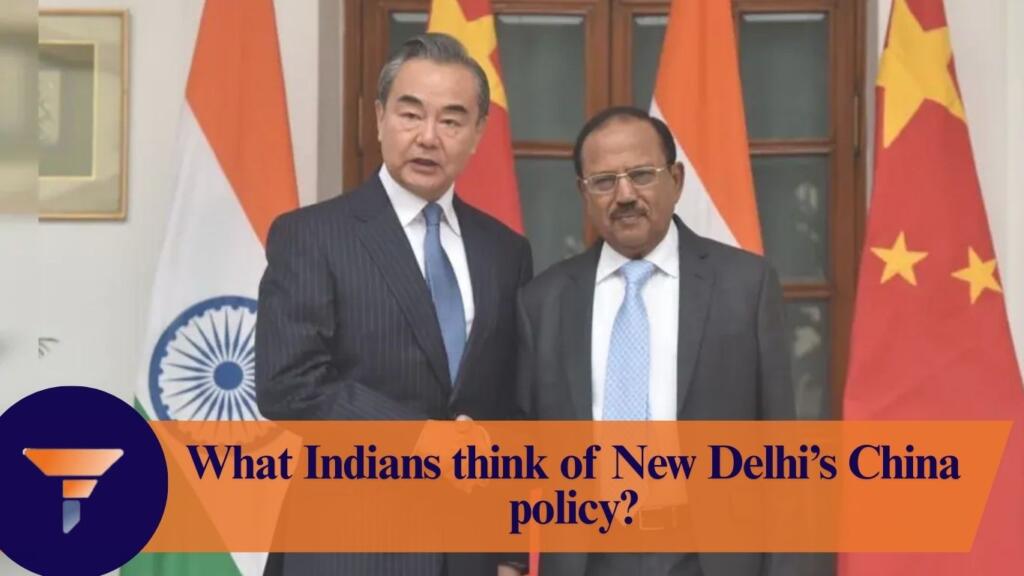Amid an increasing thaw in India-China relations since the heads of governments, Prime Minister Narendra Modi and President Xi Jinping, met for the first time in five years this October, a new survey assessing the mood of the nation says the people support the foreign ministry’s sentiment that the border dispute is the “biggest stressor” in the bilateral ties.
The survey, titled “Pulse Of The People: State of India-China Relations Survey Report 2024”, is brought out by Takshashila Institution and authored by Anushka Saxena, Manoj Kewalramani, and Amit Kumar.
It was published a day ahead of India’s National Security Adviser Ajit Doval slated meeting with his Chinese counterpart and Foreign Minister Wang Yi in Beijing. They held the 23rd round of the Special Representatives’ (SR) talks and discussed a range of issues to rebuild the bilateral ties following the October 21 agreement of disengagement and patrolling in eastern Ladakh.
In what is seen as China showing enthusiasm for the talks, Chinese Foreign Ministry spokesperson Lin Jian told a media briefing that China is prepared to settle differences with sincerity.
The spokesperson said, “China is ready to work with India to implement the important common understandings between the leaders of China and India, respect each other’s core interests and major concerns, strengthen mutual trust through dialogue and communication, properly settle differences with sincerity and good faith, and bring bilateral relations back to the track of stable and healthy development as soon as possible.”
This development is in sync with the respondents of the survey who back India’s efforts to have a political dialogue with the Chinese leadership on the border dispute and other issues. They go further to suggest simultaneously strengthening India’s defense infrastructure.
The survey reveals, “Amidst intense deliberations surrounding a solution to the ongoing tensions in India-China relations, the Survey also assessed the respondents’ opinions on the best way forward. Strengthening India’s military posture and deterrence (41.2%), and at the same time, re-starting high-level political dialogue at the level of leaders on the two sides (31%), have emerged as the two most popular policy suggestions.”
The survey reveals an interesting insight on what Indians think about taking sides between China and the West. The survey says that despite the positive sentiment expressed towards India’s increased economic cooperation with China, “an overwhelming majority of Survey respondents (69.2%) makes the case that if push comes to shove, India must closely align with the US-led West, and not with China and Russia”.
On two key ‘red lines’ China perceives as critical to its territorial integrity, national security, and ideological stability – the issues of Tibet and Taiwan, respondents weighed in to suggest India’s policy options. When asked what India should do if both Beijing and the… pic.twitter.com/5XHknLrdlV
— Takshashila Institution (@TakshashilaInst) December 17, 2024
This is pertinent to understand the prevailing domestic sentiment in India – that even though there exist vocal lobbies supporting China as an ancient civilisational partner and Russia as a historical friend and trade partner, the US and its network of alliances is seen as more beneficial for India’s global ambitions and national interests, the survey notes.
The authors of the survey contend that “the Indian populace does not agree with the Chinese approach of applying the prism of US-China competition to India-China relations”.
The other main points, to quote from the survey, are the following:
*A notable group (26.6%) also believes that China’s inroads and influence in India’s neighbourhood is the second-most vital stressor in the bilateral relationship.
*Respondents have expressed a positive attitude vis-à-vis India’s greater engagement with China. A majority of them agree that greater trade with China is in India’s developmental and security interest (49.6%), and that investments from China are beneficial, especially in sectors opening up new employment opportunities for Indians (56.3%).
*A vast majority (61.5%) believe that if the Chinese political ecosystem was more democratic, with multiple political parties contesting for leadership and power, India’s relations with China may well have been better.
*However, 46.6% believe that the trajectory of the relationship between the two rising neighbours is bound to be difficult regardless of the leader in power in Beijing.
*Overwhelmingly, a majority of the respondents (69.2%) believe that if forced to choose, India must align closely with the US-led West, and not the China-Russia axis.
*However, a majority also believe that the Quad has only been somewhat effective (50.8%) in countering China. Many respondents (44.4%) even see it as “ineffective” in this regard.
*When asked what India should do if both Beijing and the Tibetan Administration-in-Exile in India nominate their own successors to the current Dalai Lama, an overwhelming majority (64%) expressed support for the latter nominee. A minority believes that India must recognise neither (17.9%).
*On the Taiwan-China issue, most respondents said that India should play the role of a peace-broker (54.4%), encouraging diplomacy and negotiation toward a peaceful resolution.
The survey notes that India’s difficult relations with Pakistan, which continue to remain a visceral and emotive issue within the populace, “have not been deemed prominent in determining India-China relations”. China’s inroads in India’s neighbourhood, however, has been deemed “the second-most important stressor”, after the boundary dispute.
